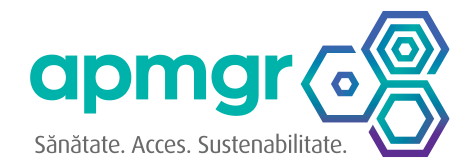- Representatives of The Ministry of Public Finance and Health refuse to consider any viable solution which could provide access to affordable medicine and prevent the destruction of the local pharmaceutical industry.
- The majority generic medicines producers with units in Romanian are still obliged to pay for the deficiencies of the past legislation and for the income obtained by pharmacies and distributors. The government policy is pushing these producers towards insolvency and hundreds of affordable priced medicine is risking disappearing from the market.
- APMGR together with Patients’ Associations will start a public information campaign on the serious social and economical consequences triggered by the government policy on this domain.
BUCHAREST, 14TH AUGUST, 2012– The Associationof Romanian Producers of Generic Medicines (APMGR), association representing the interest of main investors present on Romanian market, rejects the new Government proposal to regulate the claw back tax by reducing the access of population to affordable priced drugs and will result in the destruction of the country’s domestic pharmaceutical industry.
The new draft ordinance for modifying claw back tax, under public debate on the Ministry of Public Finance website, ignores any proposal coming from generic drugs producers. Moreover, the representatives of the Ministry of Public Finance have proposed measures that will continue to penalize the producers of generic drugs.
“The Producers of generics are seen as a part of the problem represented by a unsustainable consumption of medicines, instead of being considered a solution for obtaining an efficient allocation of budgetary funds for Health Sector, as it would happen in all the EU countries” stated Laurentiu Mihai, Executive Director of APMGR.
The producers of generic drugs are in no way responsible for the unsustainable increase of medicines consumption from the last few years. This is caused by the expenditure increase on costly treatments, on the premises of issuing a newly enlarged list of reimbursable drugs in 2008 and eliminating the reimbursement limit in pharmacy, added Mr. Mihai.
Generic drugs represent, in volume, two thirds of the present day treatments used by patients in Romania while the expenditure triggered by these treatment represent fewer than 30% of financial resources. On the other hand, the negative impact of claw back tax is much higher on producers of drugs at accessible prices.
Another concern is caused by the possible exclusion of medicines costing less than 10 RON from the list of subsidized drugs. This will reduce immediately the access to treatment for those patients with low income and an increase in budget expenditure on medium term. The possibility of covering these treatments from state budget funds is financially nonviable and a bureaucratic burden.
- APMGR will discuss with all Patients’ Associations about the start of a public information campaign on the serious social and economical consequences triggered by the government policy in the health care sector.
The member companies of APMGR continue to support the following principles in making a sustainable claw back tax by the industry:
· A NEW VERSION OF THE CLAW BACK TAX, STARTING WITH JANUARY 1ST 2013, WHICH SHALL EXCLUDE FROM CALCULATION THE MEDICINES WITH MANUFACTURING PRICE UNDER 30 RON.
Thus, population has access to basic medication, as stipulated in the governmental program assumed by the present Government. At the same time, this measure would limit the negative effects on generic drugs producers.
- THE CALCULATION BASE OF THE TAX MUST BE THE SELLING PRICE OF THE MANUFACTURER NOT THE SHELF PRICE;
- THE REAL CONSUMPTION FROM PREVIOUS YEAR MUST BE THE REFERENCE AMOUNT USED IN CALCULATING TAX;
THE PAYMENT TERM SHOULD BE CORRELATED WITH DEFRAY TERM (RIGHT NOW 300 DAYS IN THE PHARMACIES).
